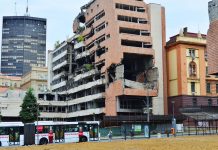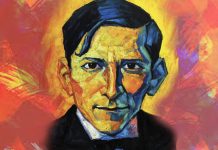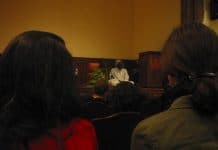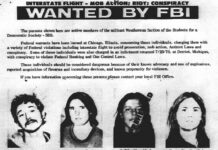Hugo Chávez, lederen af Venezuelas ‘bolivariske revolution’ døde 5. marts 2013 efter længere tids kræftsygdom. Efter valget til præsident i 1998 har han været en stærk kritiker af neoliberalismen, erklæret socialist og latinamerikansk hadeobjekt for USA.
Se også på Socialistisk Bibliotek / See also:
- Tidslinjen: 6. december 2015 om parlamentsvalg i Venezuela + om tiden efter Hugo Chavez (under afløseren Nicolas Maduro’s styre) / On the development in Venezuela since the death of Chavez.
- Linkboxen: Hugo Chávez og den »bolivarianske revolution« i Venezuela, med baggrund, analyser og venstrefløjs-diskussion af udviklingen i Venezuela (sites, artikler på dansk og engelsk + bøger)./ Chavez and the ‘Bolivarian revolution’ – debate on the international left.
- Linkboxen: Simon Bolivar (1783-1830).
Se også:
Billeder fra begravelsesoptaget i Caracas [6. marts 2013]. Af Alfred Lang (Modkraft, 11. marts 2013) + Et udpluk af citater fra Venezuelas præsident Hugo Chávez.
Vi samler her løbende nogle udvalgte nekrologer og artikler fra dansk og international progressiv presse:
På dansk:
Hugo Rafael Chávez Frías – 1954-2013. Af Andreas Bülow (Modkraft.dk/Kontradoxa, 6. marts 2013). “Den oprørske oberstløjtnant fra Barinas vil blive husket som anti-imperialisten, der aldrig overgav sig.”
Chávez forandrede Venezuela, Latinamerika og verden. Af Nikolaj Møller Kofod & Sven-Erik Simonsen (Arbejderen.dk, 6. marts 2013; online på Internet Archive). “Hugo Chávez efterlader et Venezuela i sorg – et Venezuela, som Chávez forandrede sammen med den bolivarianske folkebevægelse …”
In English:
- Death and state funeral of Hugo Chávez (Wikipedia.org)
From ‘For now’ to ‘Forever more’: How Venezuelans said goodbye to Hugo Chavez. By Ewan Robertson (Venezuelanalysis.com March 10, 2013).
President Hugo Chavez English Language Tribute Page (Facebook page). “Rest in Peace President Chavez. From supporters of Venezuela around the world.”
‘His death left unanswered questions’ (Revolutionary Lives, February 4, 2014; online at Internet Archive). Mike Gonzalez introduces his book, Hugo Chavez: Socialist for the Twenty-First Century (Pluto Press, 2014, 176 p.). “The author takes a radical, and in parts critical approach to Chávez’s political decisions and his legacy. ”
Venezuelan president Hugo Chávez dies (Democracy Now! March 5, 2013). Video interviews + more coverage of Hugo Chávez on Democracy Now!
The reckoning: the future of the Venezuelan Revolution. By Mike Gonzales (International Socialism, Issue 143, Summer 2014). “For the moment the great collective impulse of the early days of Chavismo has given way to a kind of passivity, a politics determined and dictated from above that serves only the interests of an entrenched, self-serving ruling bureaucracy.”
Chávez obituary: man, myth and legacy. By Nick Rogers (Weekly Worker, Issue 953, March 14, 2013). “The key question for socialists and communists in drawing up a balance sheet of Chávez’s legacy is … the relationship between Chávez and the popular movement that sustained him, ie the balance of class power.”
What is Hugo Chávez’s legacy? By Jeffery R. Webber (SocialistWorker.org, March 8, 2013). “To his wealthy and light-skinned enemies, he was evil incarnate. To many of Venezuela’s poor, he was one of their own.”
Chávez – no hero of ours. By Pablo Velasco (Workers’ Liberty, 7 March 2013). “Chávez’s ‘socialism’ was from above, a mix of pan-Latin American nationalism combined with the use of social welfare spending to build and expand his social base in Venezuelan society.”
Hugo Chavez and me: challenging the Washington consensus. By Tariq Ali (CounterPunch, March 7, 2013). “What of the country he leaves behind? A paradise? Certainly not. How could it be, given the scale of the problems? But he leaves behind a very changed society in which the poor felt they had an important stake in the government.”
Hugo Chavez 1954-2013 (Socialist Worker, Issue 2343, 6 March 2013). “Venezuela’s president Hugo Chavez Frias has died in hospital after a long fight with cancer. Mike Gonzalez looks back at Chavez’s life and ideas—and the Venezuela he leaves behind.”
Hugo Chavez dies, US officials expelled over coup plot. By Ryan Mallet-Outtrim (Green Left, March 6, 2013). “The Bolviarian revolution has greatly reduced poverty, nationalised strategic industries and promoted a range of new forms of participatory democracy. ”
Chávez’s chief legacy: building, with people, an alternative society to capitalism. By Marta Harnecker (MR Online, 6 March 2013). “Building with people, for Chávez, meant winning their hearts and minds for a new social project. And this cannot be done by preaching, it can only be done through practice.”
The legacy of Hugo Chávez. By Derrick O’Keefe (SocialistWorker.org, March 6, 2013). “Today, I would rather celebrate the majority of Venezuelans – especially the poor and the marginalized. It is, after all, the people who made Chavez, and not the other way around.” With links to other tributes to Chávez + to background on the Venezuelan revolution.
The end of Chavismo? (Michael Roberts Blog, March 6, 2013). “What does the future hold for Chavismo? Any new government will be desperate to sustain revenue and to see oil prices remain as high as possible. The power to achieve that, however, lies elsewhere and in economic terms Venezuela is a price taker.”
Chavez: farewell to neoliberalism’s nemesis. By Chris Nineham (Counterfire, 6 March 2013). “Chavez proved that radical policies work and win support and that defiance of US imperialism is possible and popular.”
Venezuela’s Hugo Chavez dead. By Bill Van Auken (World Socialist Web Site, 6 March 2013). “While these programs [social assistance programs for the poor] undoubtedly improved literacy levels, health care, housing and income levels for Venezuela’s impoverished majority, the commanding heights of the economy remained firmly in the hands of a financial elite.”
Hugo Chávez is dead: the fight for socialism lives (In Defence of Socialism, 6 March 2013). “Hugo Chávez is no more. The cause of freedom, socialism and humanity has lost a courageous champion.”
On the legacy of Hugo Chávez. By Greg Grandin (The Nation, March 5, 2013). “Critics disparage him as a strongman, but Chávez leaves behind what might be the most democratic country in the Western Hemisphere.” With links to a selection of The Nation’s reporting on Chávez and Venezuela.
Hugo Chávez is dead. By Louis Proyect (The Unrepentant Marxist, March 5, 2013). “Venezuelan leader leaves legacy of literacy and healthcare for poor alongside crumbling infrastructure and dependence on oil.”
Part 2 (YouTube.com, 8:52 min.)
Down from the Mountain. By Greg Grandin (London Review of Books, Vol.39, No.13, 29 June 2017). Review of Hugo Chávez and Ignacio Ramonet, Chávez, My First Life (Verso, 2016, 544 p.). “A series of interviews conducted with Ignacio Ramonet between 2008 and 2011 … [the books] ends on the threshold of Chávez’s Bolivarian Revolution, with his 1998 election.”































